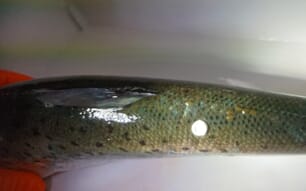
© Andrea Magugliani
Researchers at the University of Bergen (UiB) have launched FishMet, an early-stage proof-of-concept that turns decades of marine physiology and behavioural research into practical tools for aquaculture. The project uses digital twin models to test smarter, more sustainable fish-feeding strategies.
A digital twin model is a virtual replica of a real fish or farming system that combines data, simulations and scientific models to predict behaviour – such as appetite, growth and health – so farmers can optimise feeding and management.
From Lab to Proof-of-Concept
Developed by UiB professor Ivar Rønnestad and researcher Sergei Budaev (Department of Biological Sciences) in collaboration with Vestlandets Innovasjonsselskap (VIS), FishMet focuses on precision farming for salmon and trout. Although still at a low Technology Readiness Level (TRL), the concept has been made available for exploratory licensing opportunities through VIS.
How the Digital Twin Works
FishMet simulates appetite, digestion, metabolism and growth by integrating biological and environmental data (e.g. fish size, feed type and timing, water temperature, dissolved oxygen and behavioural observations). It then estimates feed intake, gut transit, growth rates, feed conversion efficiency and even stress or motivation indicators. Designed as a modular, stochastic simulation, it can model individual fish or entire populations. A web portal and data interface will let users trial it and link it to farm software to test decision-support tools.
‘’We aim to create a transparent digital salmon that combines AI with decades of biological knowledge, serving both as a research tool and a practical aquaculture predictor, especially in situations lacking data,’’ said Budaev in a press release.
From Research to Early Results
Many years of experimental work by the UiB team on gut-brain signalling, digestion rate and neurohormones underpins FishMet’s algorithms. Initial pilot tests have shown promising predictive accuracy – estimating gut transit times in rainbow trout and growth performance in Atlantic salmon. While further validation is needed, the potential benefits include reduced feed waste, improved growth efficiency and lower environmental impact in salmon farming.
FishMet remains an early-stage concept, but its biology-rooted transparency could give it advantages over opaque, purely data-driven systems. Future development may expand its scope to additional fish species or life-stage transitions such as smoltification or maturation control.
While still a proof-of-concept, FishMet shows how university research – supported by innovation partners such as VIS – can progress towards real-world applications in sustainable aquaculture.




